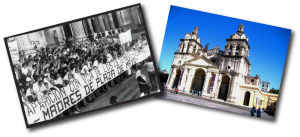 This ICNC Academic Webinar took place on Wednesday, April 6, 2016 at 12 p.m. EST.
This ICNC Academic Webinar took place on Wednesday, April 6, 2016 at 12 p.m. EST.
This academic webinar was presented by Sharon Erickson Nepstad, Professor of Sociology at the University of New Mexico in Albuquerque.
This webinar is transcribed into Chinese
Watch webinar below:
Webinar content:
1. Introduction of the Speaker: 00:00- 00:30
2. Presentation: 00:42 – 34:44
3. Questions and Answers: 34:45 – 57:07
Webinar Summary
In the study of civil resistance, pragmatic approaches have dominated, emphasizing the strategic action of resisters and governments. More recently, researchers have acknowledged that other actors – such as the military or the international community – play important roles in nonviolent struggles. While previous studies have focused on influence of military elites, whose decision to side with the movement or remain loyal to the state can profoundly affect the outcome, we know less about other types of elites, their behavior and potential impact on the nonviolent resistance. In this presentation, Professor Nepstad explores the role of religious elites in civil resistance conflicts.
Using comparative historical methods, Professor Nepstad compares the different political stances of the Catholic Church hierarchy in the 1970s-1980s in Chile (where the church opposed the dictatorship), Argentina (where the church was largely supportive of the state), and El Salvador (where the church hierarchy was divided over the political conflict). She asks two key questions: 1) What factors influenced religious leaders to either support or oppose civil resisters? and 2) In what specific ways did religious support or opposition affect the nonviolent movements’ trajectories? She concludes that religious elites are most likely to side with civil resisters when the religious institution receives no financial or political benefits from the regime, when state repression is indiscriminate, and religious leaders have close ties to the aggrieved. It is unclear whether state violence affects religious’ leaders decision to break ties with the authorities. When religious elites do support civil resisters, they can provide a variety of benefits, including transnational ties (and the potential for international solidarity), material resources, and moral legitimacy.
Presenter
 Sharon Nepstad is a professor of Sociology at the University of New Mexico in Albuquerque. Her interests are in social movements, religion, and civil resistance studies. She is the author of numerous articles and four books, including Nonviolent Struggle: Theories, Strategies, and Dynamics (2015, Oxford University Press); Nonviolent Revolutions (2011, Oxford University Press); Religion and War Resistance in the Plowshares Movement (2008, Cambridge University Press); and Convictions of the Soul (2004, Oxford University Press). She has been a visiting scholar at Princeton’s Center for the Study of Religion and at Notre Dame University’s Kroc Institute for International Peace Studies.
Sharon Nepstad is a professor of Sociology at the University of New Mexico in Albuquerque. Her interests are in social movements, religion, and civil resistance studies. She is the author of numerous articles and four books, including Nonviolent Struggle: Theories, Strategies, and Dynamics (2015, Oxford University Press); Nonviolent Revolutions (2011, Oxford University Press); Religion and War Resistance in the Plowshares Movement (2008, Cambridge University Press); and Convictions of the Soul (2004, Oxford University Press). She has been a visiting scholar at Princeton’s Center for the Study of Religion and at Notre Dame University’s Kroc Institute for International Peace Studies.
Recommended Readings:
- Mignone, Emilio. 1988. Witness to the Truth: The Complicity of Church and Dictatorship in Argentina, 1976-1983, translated by Philip Berryman. Maryknoll, NY: Orbis Books.
- Morello, Gustavo. 2015. The Catholic Church and Argentina’s Dirty War. New York: Oxford University Press.
- Peterson, Anna. 1997. Martyrdom and the Politics of Progressive Religion: Progressive Catholicism in El Salvador’s Civil War. Albany: State University of New York.
- Sigmund, Paul E. 1986. “Revolution, Counter-Revolution and the Catholic Church in Chile.” Annals of the American Academy of Political and Social Science 438: 25-35.
- Smith, Brian H. 1982. The Church and Politics in Chile: Challenges to Modern Catholicism. Princeton, NJ: Princeton University Press.